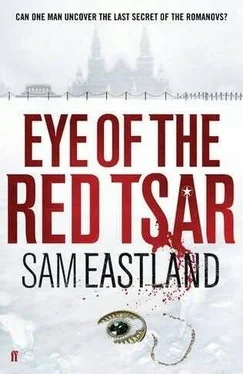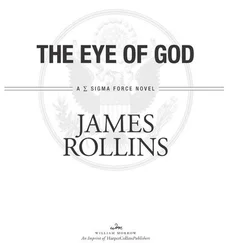“Insects!” said Bandelayev, by way of explanation. “This is not merely a shop of rotten meat, as some of my colleagues have described it. Here, all facets of decay are controlled. One fly could ruin weeks of work.” Bandelayev did not like to sit. It seemed an act of laziness to him. So when he lectured Pekkala, he stood behind a tall table littered with bones, which he would lift from their trays and hold out for Pekkala to identify. Or he would plunge his hand into a jar and remove a pale knot of flesh, commanding Pekkala to name it, while brown preserving fluid ran the length of his fingers, trickling down his sleeve.
Once, Bandelayev held up a skull pierced through the forehead by a small, neat round hole, the result of a bullet fired point-blank into the victim. “Do you know that in the summer months, blowflies will settle on a body in a matter of minutes. They will concentrate in the mouth, the nose, the eyes, or in the wound.” Bandelayev stuck his pinkie into the hole in the forehead. “In a few hours, there can be as many as half a million eggs laid on the corpse. In a single day the maggots which hatch from these eggs can reduce a full-grown man to half his body size. In a week”-he jerked his head to the side, a movement he used for emphasis but which appeared more like an involuntary nervous twitch-“there might be nothing left but bones.”
Having seen many bodies laid out on his father’s marble work slab, Pekkala was not squeamish. He did not flinch when Bandelayev thrust a lung into his hands or handed him a box of human finger bones. The hardest part for Pekkala, accustomed to his father’s quiet reverence for the bodies in his care, was Bandelayev’s total disregard for the people whose corpses he alternately pulled apart and reassembled, allowed to rot or pickled in preserving fluid.
His father would not have liked Bandelayev, Pekkala decided. There was something in Bandelayev’s breathless enthusiasm which would have struck his father as undignified.
When Pekkala mentioned that his father had been an undertaker, Bandelayev seemed equally unimpressed. “Quaint,” the doctor said dismissively, “and ultimately irrelevant.”
“And why is that?” asked Pekkala.
“Undertaking,” said Bandelayev, “is the creation of an illusion. It is a magic show. Make the dead appear at peace. Make the dead appear asleep.” He glanced at Pekkala, as much as if to ask-and what could be the point of that? “Osteology is the exploration of death.” Bandelayev wrapped his lips around those words as if no person could resist the urge to pull apart a corpse with bare hands and a blade.
“Alive,” he continued, “you are of little interest to me, Pekkala. But come back to me dead, and then I promise you we will become properly acquainted.”
Pekkala learned to differentiate between the skulls of women-narrow mouth, pointed chin, streamlined forehead, sharp edges where the eye sockets met the forehead-and the skulls of men, immediately identifiable by the bony bump at the base of the skull.
“Identity!” said Bandelayev. “Sex, age, stature.”
He made Pekkala chant it like a spell.
“The external occipital protuberance!” announced Bandelayev, as if introducing a dignitary to a gathering of royals.
Pekkala learned to tell the forward-angled teeth of an African from those of a Caucasian, which grew perpendicular to the jaw.
He studied the zigzag lines of cranial sutures, rising like lightning bolts over the dome of a skull, while Bandelayev leaned over his shoulder, muttering, “What is it saying? What is it telling you?”
At the end of each lesson, Bandelayev assigned Pekkala books by such men as the Roman Vitruvius, from which he learned that the length of a person’s outstretched arms corresponded to his height and that the length of a hand corresponded to one-tenth of a body’s length.
Another day, Bandelayev sent him home with a translation of the thirteenth-century Chinese doctor Sung Tz’u’s book, The Washing Away of Wrongs, in which the devouring of a body by maggots was described in language Pekkala had previously thought was reserved only for religious rapture.
Soon the reek of death no longer bothered him, even though it lingered in his clothes long after he had left Bandelayev’s laboratory.
Throughout the weeks they spent together, Bandelayev returned over and over to the question “What is it saying?”
One day, Bandelayev was teaching a lesson on the effect of fire upon a corpse. “The hands will clench,” he said, “arms bend, knees bend. A body on fire resembles the stance of a boxer in a fight. But suppose you find a body which has been burned but discover that the arms are straight. What does that say?”
“It says,” answered Pekkala, “that perhaps his hands were bound behind his back.”
Bandelayev smiled. “Now you are speaking the language of the dead.”
To Pekkala’s surprise, he realized that Bandelayev was right. Suddenly from every jar and tray, voices seemed to clamor at him, telling the story of their deaths.
THE FLAMES HAD BURNED DOWN ON THE FLOOR OF THE BARN. Poppy-colored embers glowed among the ashes.
Outside, lightning flashed across the sky.
“Who is Grodek?” asked Kirov.
Pekkala breathed in sharply. “Grodek? What do you know about him?”
“I heard your brother say you put a man named Grodek behind bars.”
Facing away from Kirov, Pekkala’s eyes blinked silver in the dark. “Grodek was the most dangerous man I ever met.”
“What made him so dangerous?”
“The question is not ‘what’ but ‘who.’ And the answer to that is the Tsar’s own Secret Police.”
“The Okhrana? But that would mean he was working for you, not against you.”
“That was the plan,” replied Pekkala, “but it went wrong. It was General Zubatov, head of the Moscow Okhrana, who came up with the idea. Zubatov wanted to organize a terrorist group whose sole purpose was to be the assassination of the Tsar.”
“But Zubatov was loyal to the Tsar!” Kirov protested. “Why on earth would Zubatov want to assassinate him?”
As the sound of Kirov’s voice echoed around the barn, Anton grumbled, muttered something unintelligible, and then fell back asleep.
“The group would be a fake. Zubatov’s plan was to draw in as many would-be assassins as he could. Then, when the time was right, he would have them all arrested. You see, in ordinary police work, it is necessary to wait until a crime has taken place before taking people into custody. But in organizations like the Okhrana, the task is sometimes to anticipate the crimes before they have happened.”
“So all the time these people believed they were working for a terrorist cell, they would in fact be working for Zubatov?”
“Exactly.”
The young Commissar’s eyes looked glazed as he struggled to fathom the depth of such deception. “Was Grodek a part of this cell?”
“More than a part of it,” replied Pekkala. “Grodek was the one in charge. He was younger than you. His father was a distant cousin of the Tsar. The man had failed in business many times, but instead of accepting responsibility for his failures, he chose to blame the Tsar. Grodek believed that his family had been denied the privileges they deserved. When his father committed suicide after piling up more debts than he could ever repay, Grodek held the Tsar responsible.”
“Why wouldn’t he,” said Kirov, “if he only knew what his father had told him?”
“Precisely, and as Grodek grew into a young man, he made no secret of his hatred for the Romanovs. He was the perfect candidate for leading an assassination attempt.”
“But how could a person like that be persuaded to work for the Okhrana? That seems impossible to me.”
Читать дальше










